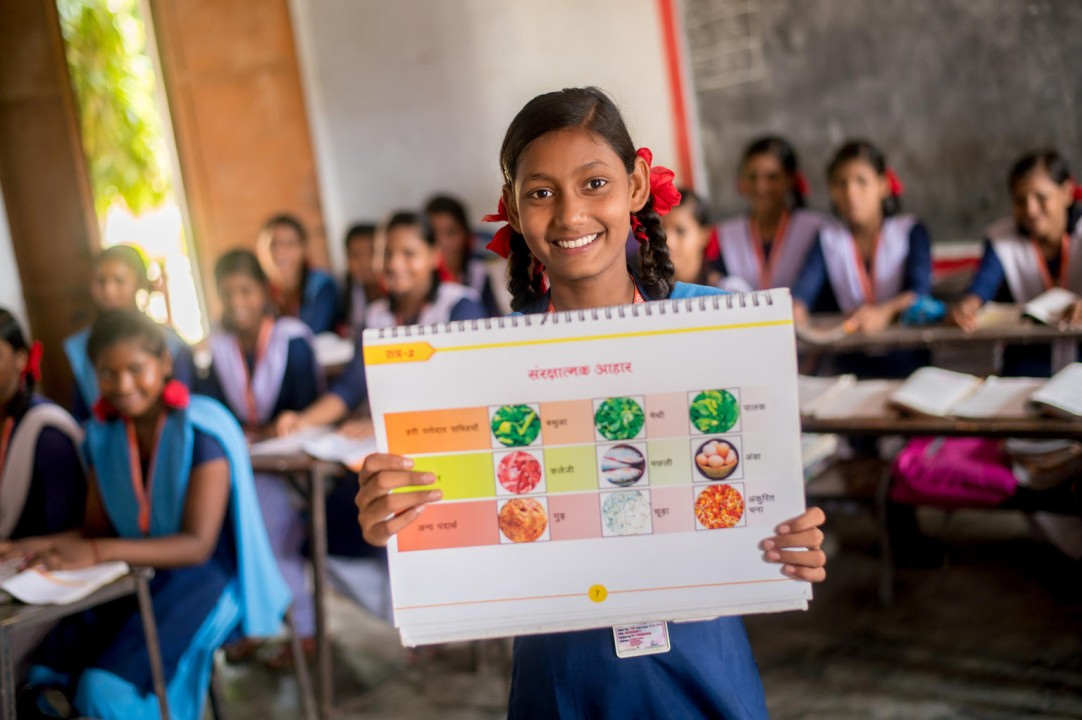Education and Nutrition: IndiaÔÇÖs Commitment to its Youngest Citizens
Written By : 06-09-2024 06:07:08 PMSanjana Manaktala, Lead ÔÇô National Initiatives and Apurva Desai, Lead ÔÇô Communications
India boasts two remarkable assets ÔÇô the worldÔÇÖs largest population of adolescents and youth, and an extensive network of public nutrition and childcare centers. Spread across the nation, 13.9 lakh operational Anganwadi centers play a pivotal role in providing supplementary nutrition and early education to 8 crore children under the age of 6. This demographic advantage is central to the Indian governmentÔÇÖs vision of a ÔÇśNew India.ÔÇÖ Through a comprehensive approach aimed at fostering the holistic development of our children, mothers, and women, the nation is steadfast in its commitment to empower the future builders of the country.

In 2018, HonÔÇÖble Prime Minister Shri Narendra Modi launched the Poshan Abhiyaan to accelerate progress towards a malnutrition-free India. The initiative underwent restructuring and evolved into Saksham Anganwadi and Poshan 2.0 during the 15th Finance Commission period from 2021 to 2025. This program offers supplementary nutrition to children aged 6 months to 6 years, pregnant and lactating mothers (PWLM), and adolescent girls. Under the Saksham Anganwadi program, several innovative policy interventions highlight the countryÔÇÖs dedication to eradicating malnutrition, improving child health, enhancing learning capacity, and reducing mortality rates.
Under the guidance of HonÔÇÖble PM Shri Narendra Modi, the Poshan Tracker Application was introduced in 2021 to record and digitize data related to malnutrition and service delivery at the grassroots level. Anganwadi workers were equipped with smartphones for dynamic identification of stunting, wasting, and underweight prevalence among children. The application also provides supervisors and program officials with access to a web-based dashboard to monitor progress and address supply chain gaps. During Poshan Maah in March, the height and weight of 7.5 crore children were measured according to WHO standards and uploaded to the Poshan tracker in a record 15 days.
Real-time monitoring of Anganwadi centers, workers, and beneficiaries through defined indicators has significantly contributed to a comprehensive overview of program progress. The availability of the application in regional languages underscores the governmentÔÇÖs commitment to ÔÇśSabka Sath, Sabka Vikas.ÔÇÖ
Early learning is undeniably essential for children to reach their full potential. This commitment is reflected in the inclusion of Early Childhood Care and Education (ECCE) for children aged 3-6, as well as early stimulation for those aged 0-3. ÔÇśPoshan Bhi, Padhai Bhi,ÔÇÖ or Education Along with Nutrition, was introduced as a key theme in September 2022 during Poshan Maah, with the Ministry conducting 81 lakh education events across the country.
The ÔÇśTeam up for ToysÔÇÖ initiative was launched under the National Action Plan for Toys, promoting the creation of ÔÇśDo It Yourself (DIY)ÔÇÖ toy kits to enhance childrenÔÇÖs sensory and cognitive development. Toys, used as teaching-learning materials, also aid in oral language development, cultural value understanding, and physical development. ÔÇśCreation WorkshopsÔÇÖ were organized for all Anganwadi workers, where they were trained by expert trainers to use locally available materials, such as spare textiles and building materials, to craft indigenous toys. Additionally, states have been paired up under ÔÇśEk Bharat Shresth BharatÔÇÖ to exchange their toy cultures, contributing to increased awareness and production of indigenous toys in India.
The evolved ECCE program, with a focus on play-based and activity-based learning, aims to target developmental milestones for children aged 0-6. It aligns with the guidelines of the National Education Policy (NEP) 2020 and encompasses cognitive, motor, socio-emotional, creative, and aesthetic domains. With a mandate of at least 2 hours of high-quality preschool instruction daily, delivered in the childÔÇÖs mother tongue, the program aims to nurture the potential of our youngest citizens and connect them with their culture and local communities.
The realization of this vision relies on the dedicated efforts of Anganwadi workers, who have been at the forefront of IndiaÔÇÖs battle against malnutrition, infant and maternal mortality reduction, and the challenges posed by COVID-19. The government recognizes the pivotal role of women, mothers, and Anganwadi workers in national development.
To facilitate the transition into high-quality pre-school learning providers, the Ministry, through the National Institute for Public Cooperation and Child Development, is upgrading Anganwadi infrastructure and providing training and capacity building support to these frontline workers. They will be equipped with fun, play-based activities tailored to each childÔÇÖs developmental stage, along with various teaching materials, both online and offline. Certificates will be awarded to participants, acknowledging their valuable contributions.
In September 2023, as part of IndiaÔÇÖs commitment to promoting early childhood education and nutrition, an impressive milestone was achieved. A total of 3.23 crore play-based activities were conducted across the country. This significant accomplishment showcases the dedication and collective efforts of Anganwadi workers, communities, and the government in ensuring the holistic development of children.
In the words of HonÔÇÖble PM Shri Narendra Modi, IndiaÔÇÖs youth have the potential to change not only the nation but the world. With ÔÇśPoshan Bhi, Padhai Bhi,ÔÇÖ India aspires to create a literate, healthy, and empowered future, starting today.ÔÇŁ

https://rocketlearning.org/education-and-nutrition-indias-commitment-to-its-youngest-citizens/ Click Here






